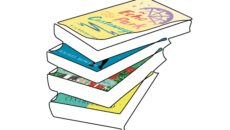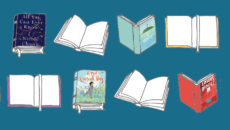Farrar, Straus and Giroux; 2015
Buy God and Jetfire: Confessions of a Birth Mother on Amazon.com >
In April, Jonathan was nine months old. The colic had subsided, and he was practicing language that Paula described as “the funniest little combination of mumbling and humming.” She said his voice was very much a little boy’s voice. He was beginning to balance on wobbly legs and had a full head of bright white hair and a mouthful of baby teeth. She sent pictures of him proudly pouring a pitcher of water over Sarah’s head in the tub, his sister’s eyes shut tight, laughing. He smiles like the sun, I thought — like the happiness is coming from within him. I realized I had thought of him like the moon.
Paula said that when Sarah turned nine months old, she realized she’d been Sarah’s mother for as long as her birth mother had, and that felt significant. People would sometimes ask about Sarah’s real mother, and although comments like that bothered her, having had her own nine-month gestation she found herself feeling a little more like a real mother. Now that Jonathan was nine months old, I hoped she’d feel more like his real mother, too, and that I might experience some kind of positive inverse: my son would feel to me more hers, and my loss, less.
We talked about these things like we weren’t right in the middle of them. We were always lightening our relationship by exposing it to air: the fraught and complex aspects of our joint/mutual/exclusive motherhoods. She was the person who came closest to being able to understand. I’d tell her really hard things — like the feelings of regret I’d unearthed at the birth mothers’ retreat — and she’d describe her own ambivalence as an adoptive mother. She said because she’d seen the strength of my bond with Jonathan, her motherhood could never be simple. Openness didn’t make anything easier, but she said it at least gave her the assurance I was busy with school and not plotting to steal my son back. I laughed at that, but it was important — being able to share some of what we were each going through was heartening. Whatever the animal complexity of what we’d done, ethically and intellectually, we were solidly on the same side.
And at nine months, Jonathan was doing his own kind of sophisticated thinking. Paula said he was now able to recognize and remember people. When he saw someone he knew, he’d smile and his face would light up. But I didn’t expect him to remember me. I wasn’t even sure I’d recognize him, he was growing and changing so fast, and yet, seeing him was remembering that he was still just a baby, and trying not to expect anything. When I arrived, he crawled furtively behind a chair and hid, and when Paula picked him up, he buried himself in her chest, only glancing at me from the safety of her arms. Sarah made things easier by leaping into mine, but as I squeezed her I wondered, If he does recognize me, what does he see? I touched his hand to say hello, and he drew it back as if he were afraid of me. And I realized I was afraid of him, too.
Paula would probably have prepared him for this visit by explaining that I was his mother in some simple way a nine-month-old could understand. This was important data he’d now be able to store and use, and maybe next time, and from then on, he’d recognize me and know something about how important our visits together were. But how could she not at the same time explain that I’d given him up? Those two facts were inseparable. Could he love me for one without hating me for the other?
That question consumed me as I carried him to the park that afternoon. He had warmed to me after spending the morning watching Sarah climb on me, and run away squealing, and return all over again, and Paula suggested I try taking him for a walk. But it was the first time we’d been alone together since his adoption, and I was nervous. I pushed him gently on an infant swing, grabbing his toes every time he returned to me. I felt lucky when he smiled, arriving at my collarbone. But watching him watch me, I wondered what information he was now taking in to store. I talked to him continuously, trying to keep him entertained. Adding stories, and songs, and spins in a circle — in a race with his growing consciousness. The more experiences we could share as his understanding took shape, I thought, perhaps the less he would see me through the stark circumstances of his birth and adoption. His affection for me might stand a chance against his anger. He studied me at close range, and it seemed urgent: I could not let him cry. His tears at that moment would seem decisive.
Rain suddenly began falling hard, lightning and thunder; real and outside of us. We stepped into a gazebo for shelter and watched it pour. I loved storms. They bent the rules of the day; people came alive and abandoned plans and ran for cover. The rain made our strange relationship feel real. Our relationship could get wet. It invigorated me. I stepped into the storm, holding him. Me and him and the pummeling rain, the only important facts of the gray and watery world. He wrinkled his face and looked at me, and I remembered putting him in the shower as a newborn to make him cry. I tried to own the confidence in our connection I’d had then.
When the sky began to clear, the world was a steaming memory, puddles everywhere reflecting a sky that had forgotten it made them. … I lifted him and put him down at the edge of a shallow pothole. He kicked it and laughed. Then he crouched to touch it. I felt I’d found something real between us. Not my motherhood, but some simpler alliance.
After dinner Paula surprised me by putting on the mix tape I’d sent in the fall. Sarah danced, and she even sang along to some of the songs. Jonathan joined in, bouncing on his rubbery legs, and Erik bounced on his own legs a few times as he passed through clearing dishes. … We were drinking wine out of big, round glasses, watching the kids, and when my mix tape ended, she surprised me more by playing a mix tape my mother had sent, filled with children’s songs she’d taught her students in France and Germany. “Sur le pont, d’Avignon, on y danse, on y danse!” I was impressed that my mother had sent such a record, or knew how to make one, or had the same impulse I did, to share music with my son.
“I was starting to tell you before about Jevn’s visit, because it’s just — so funny how these things happen with adoption.” She sank into the couch, one leg folded underneath her, like it was a slumber party at midnight. I was a little sister, completely under her spell. “There’s this little bagel shop we discovered; we can walk to it just down the street. Maybe Erik showed it to you; it’s one of our favorite little places to go in the morning.”
“I don’t think so,” I said, shrugging. I liked hearing about Jevn, Jonathan’s birth father, from them; Paula spoke of him like he was ours.
“Well, when Jevn was here, he and I took Jonathan there. We were sitting at a little table, eating our bagels. And one of my colleagues comes in. This is someone we know through school, and you know we just can’t tell everyone the whole story, how the kids were adopted, what an open adoption is — most people know, but sometimes it’s just easier not to get into it. And sometimes we forget who knows what. Anyway, so Jevn is sitting there with Jonathan on his lap, and I see this colleague taking a good look at them while she’s in line. I wave hello, and I see the gears turning. She’s looking from Jonathan to Jevn, who is of course like a perfect adult version of him, and I see what she’s thinking.” She laughed and leaned forward. “I’m having a secret rendezvous with my child’s real father! At the bagel shop down the street!”
She laughed. I laughed; the foibles of open adoption.
I told her my own story, about a woman I’d met at a dance who, after hearing about Jonathan’s adoption, asked me if I might consider being a surrogate for her. I had a proven pelvis and a proven ability to give up my babies.
“Amy, no. You have got to be kidding me!” Paula laughed.
That night I passed the bedrooms on my way to brush my teeth. I wanted to say goodnight to Jonathan, but the bond we’d built in the afternoon felt tenuous. And he was so sensitive. Paula said his sensitivity was sometimes so extreme, he’d get upset when her coffee cup wasn’t centered on the microwave turntable. I feared what that might mean — was he trying in vain to right a world that had wronged him? But Paula took it in stride. Part of his personality. I imitated her, taking things simply, and after I brushed my teeth, I peeked in. Paula was laying him down on the bed to change him, and he had already started to cry. I could kiss him then, because then no one would know whether he was crying because of me or because of the changing. Paula stood back as I kissed his forehead, and he paused to look at me. His eyes blinked to focus through his tears. And then he started to laugh.
The next morning, my parents arrived to pick me up. … We said goodbye, and I settled into the hard cushions of the backseat, the soft seal of the doors as they closed dividing this family from that one more cleanly than I knew how to. As we drove through the mountains into Tennessee, my parents talked about what good parents Paula and Erik seemed to be. My mother said she sort of felt she hadn’t lost a grandson so much as she’d gained a son- and daughter-in-law in Paula and Erik. But after Mass the next morning, when one of her friends pulled out a photograph of her beautiful newborn grandchild, she said nothing about her own.
It was nice to be home, where family was easy. Family had always meant: eating supper together and going for hikes. It meant knowing exactly what one another will think is funny, what words make us cringe (panties, chuckle, nibble, snack); it was conversations that begin when you can’t really talk because you’re brushing your teeth and the recognizable weight of each person’s feet going down the steps in the morning. It was knowing exactly what part of the creek has the most crawdads and hiking through the tall grass to get there. It was turnip parties in the garden, when we’d take a slice right off the edge of Dad’s knife, still warm from the ground and the sun, and spicy. It was Dad making us gag by calling those sweet moments togetherness. Above all, it was being able to take one another for granted and taking the greatest imaginable comfort in that.
But with my son it was the opposite. I second-guessed every word; I doubted every touch. He changed radically every time I saw him, and I couldn’t even assume he would know who I was, or what he would see in me if he did. I’d created a whole different kind of family, one that would never be able to take anything for granted. It was only through our loss that we would know each other, and knowing each other would require intention, and care, and effort. Time together wouldn’t be easy and obvious; it would always be a kind of tending to our wounds.
Excerpted from GOD AND JETFIRE: Confessions of a Birth Mother by Amy Seek. Published by Farrar, Straus and Giroux, LLC. Copyright © 2015 by Amy Seek. All rights reserved.



